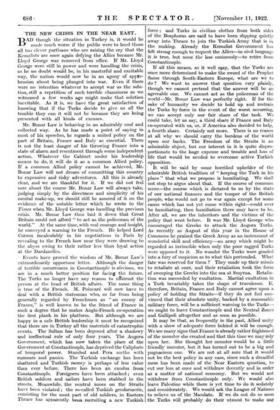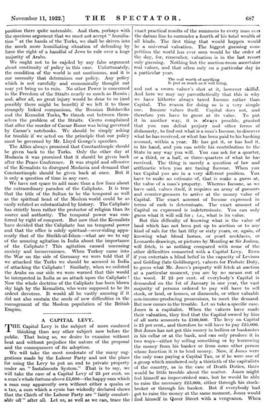THE NEW CRISIS IN THE NEAR EAST.
Mr. Bonar Law is behaving in an admirably cool and collected way. As he has made a point of saying in most of his speeches, he regards a united policy on the part of Britain, France and Italy as essential. There is not the least danger of his throwing France into a state of alarm and resentment through some independent action. Whatever the Cabinet under his leadership, means to do, it will do it as a common Allied policy. If a common Allied policy cannot be achieved, Mr. Boner Law will not dream of committing this country to expensive and risky adventures. All this is already clear, and we are thankful for it. If we did not feel sure about the course Mr. Bonar Law will always take, judging simply by the directness and simplicity of his mental make-up, we should still be assured of it on the evidence of the notable letter which he wrote to the Times when Mr. Lloyd George was handling the previous crisis. Mr. Bonar Law then laid it down that Great Britain could not afford " to act as the policeman of the world." At the same time, with real courage and insight, he conveyed a warning to the French. He helped Lord Curzon incalculably in his negotiations in Paris by revealing to the French how near they were drawing to the abyss owing to their rather less than loyal action at the Dardanelles.
Events have proved the wisdom of Mr. Bonar Law's extraordinarily opportune letter. Although the danger of terrible occurrences in Constantinople is obvious, we are in a much better position for facing the future. The Turks no longer have any reason to nifstrust the person at the head of British affairs. The same thing is true of the French. M. Poincare will now have to deal with a British statesman who, so far from being generally regarded by Frenchmen as " an enemy of France," is well known to be the friend of France in such a degree that he makes Anglo-French co-operation. the first plank in his platform. But although we are happy in a safe British leadership it must be recognized- that there are in Turkey all the materials of catastrophic events. The Sultan has been deposed after a shadowy and ineffectual rule of only four years. The Angora Government, which has now taken the place of the Government at Constantinople, has deprived the Caliphate of temporal power. Stambul and Pera seethe with rumours and panics. The Turkish exchange has been shattered and Turkish money is perhaps of less value than ever before. There has been an exodus from Constantinople. Foreigners have been attacked.; even British soldiers and sailors have been stabbed in the streets. Meanwhile, the neutral zones on the. Straits- have been violated; the so-called Turkish gendarmerie, consisting for the most part of old soldiers, in Eastern Thrace has apparently been recruiting a new Turkish force ; and Turks in civilian clothes from both sides of the Bosphorus are said to have been slipping quietly away into Thrace to join the Turkish Army that is in the making. Already the Kemalist Government has felt strong enough to request the Allies—in civil language it. is true, but none the less ominously—to retire from Constantinople.
If all this• means, as it well may, that the Turks are once more determined to make the sword of the Prophet flame through South-Eastern Europe, what are we to do ? We want to answer that question very plainly, though we cannot pretend that the answer will be an agreeable one. We cannot act as the policeman of the world—Mr. Bonar Law was perfectly right. If for the sake of humanity we decide to hold. up and restrain the Turks by force in the event of the worst occurring, we can accept only our fair share of the task. We could take, let us say, a third share if France and Italy co-operated with us, or, if America also decided to help, a fourth share. Certainly not more. There is no reason at all why we should carry the burdens of the world upon our backs. The Freedom of the Straits is an admirable object, but our interest in it is quite dispro- portionate to the huge expense and trouble and loss of life that would be needed to overcome active Turkish opposition.
It will be said by some horrified upholder of the admirable British tradition of " keeping the Turk in his place " that what we propose is humiliating. We shall not stop to argue about that. If the course of common sense—the course which is dictated to us by the state of our national finances and the temper of the British people, who would not go to war again except for some cause which has not yet come within sight—could ever be humiliating, then humiliation there may have to be. After all, we are the inheritors and the victims of the policy that went before. It was Mr. Lloyd George who encouraged the Greeks to attack the Angora Turks. As recently as August of this year in the House of Commons he praised the Greek Army as an instrument of wonderful skill and efficiency—an army which might be regarded as invincible when only the poor ragged Turks were opposed to it. No wonder the Turks were goaded into a fury of suspicion as to what this portended. What fate was reserved for them ? They made up their minds to retaliate at once, and their retaliation took the form of sweeping the Greeks into the sea at Smyrna. Retalia- tion was succeeded by exultation. Martial exultation in a Turk invariably takes the shape of truculence. If, therefore, Britain, France and Italy cannot agree upon a policy of holding the Straits—if they do not feel con- vinced that their absolute unity, backed by a reasonable military force, will be a sufficient warning to the Turks— we ought to leave Constantinople and the Neutral Zones and Gallipoli altogether and as soon as possible.
It may be that, as frequently in the past, Allied unity with a show of adequate force behind it will be enough. We see many signs that France is already rather frightened of the monster she created and that this time we may rely upon her. She thought her monster would be a little friendly monster, but it has turned out to be a big and pugnacious one. We are not at all sure that it would not be the best policy in any case, since such a dreadful mess has been made of the Near Eastern question, to cut our loss at once and withdraw decently and in order as a matter of national economy. But we would not withdraw from Constantinople only. We would also leave Palestine while there is yet time to do it sedately and considerately. We would ask the League of Nations to relieve us of the Mandate. If we do not do so soon the Turks will probably do their utmost to make our position there quite untenable. And then, perhaps with the specious argument that we must not accept " humilia- tion " at the hands of the Turks, we shall be driven into the much more humiliating situation of defending by force the right of a handful of Jews to rule over a huge majority of Arabs.
We ought not to be cajoled by any false argument about continuity of policy in this case. Unfortunately, the condition of the world is not continuous, and it is our necessity that determines our policy. Any policy which is not carefully and economically thought out may yet bring us to ruin. No other Power is concerned in the Freedom of the Straits nearly so much as Russia ; and, after all, no great injury would be done to us (and possibly there might be benefit) if we left it to those strangely linked companions, the Russian Bolsheviks and the Kemalist Turks, to thrash out between them- selves the problem of the Straits. Cicero complained that after the murder of Caesar Rome was being governed by Caesar's notebooks. We should be simply asking for trouble if we acted on the principle that our policy must be governed by Mr. Lloyd George's speeches.
The Allies always promised that Constantinople should be given back to the Turks. Only the other day at Mudania it was promised that it should be given back after the Peace Conference. It was stupid and offensive of the Kemalists to disregard Mudania and demand that Constantinople should be given back at once. But it is only a question of time in any case.
We have not space to add more than a few lines about the extraordinary paradox of the Caliphate. It is true that the title of the Sultan to be the temporal as well as the spiritual head of the Moslem world could be as easily refuted as substantiated by history. The Caliphate has strictly been rather the protector of religion than its source and authority. The temporal power was con- ferred by right of conquest. But now that the Kemalists have decided that the Caliphate has no temporal power and that the office is solely spiritual—over-riding appa- rently that of the Sheikh-ul-Islam—what are we to say of the amazing agitation in India about the importance of the Caliphate ? This agitation caused unceasing anxiety and inconvenience. When Turkey came into the War on the side of Germany we were told that if we attacked the Turks we should be accused in India of attacking the Caliphate ! Similarly, when we enlisted the Arabs on our side we were warned that this would be interpreted in India as an attack upon the Caliphate Now the whole doctrine of the Caliphate has been blown sky high by the Kemalists, who were supposed to be its ardent devotees. It would all be vastly amusing if it did not also contain the seeds of new difficulties in the management of the Moslem population of the British Empire.



























































 Previous page
Previous page